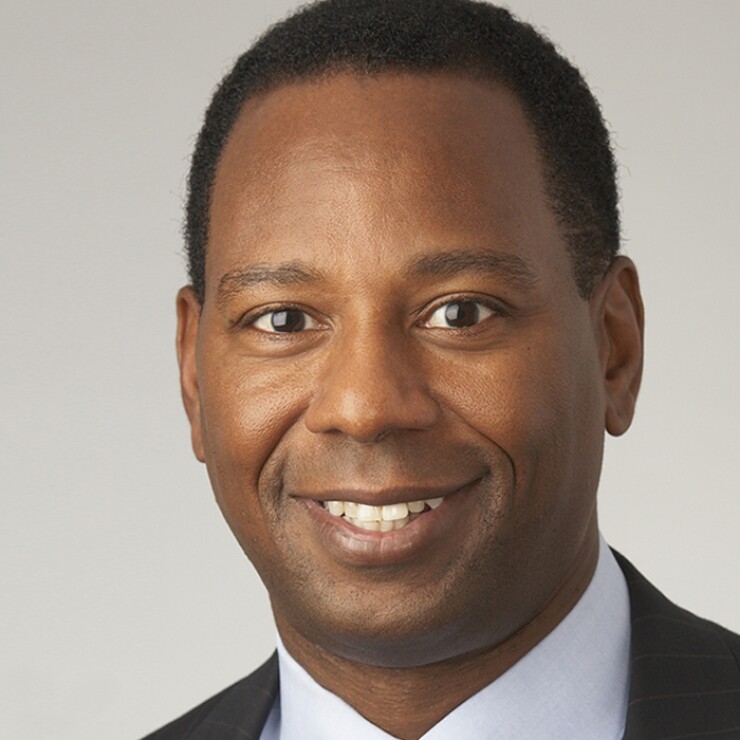RBC Capital Markets has added a new managing director with housing expertise in California as governments ramp up spending on affordable housing.
The firm wants to capitalize on the momentum as states and local governments, along with private initiatives like one from Google, put money toward housing availability and homelessness crises in major West Coast cities.

Ian Parker moved to RBC from Goldman Sachs, where he spent the past 11 years, most recently as a managing director leading the western region's San Francisco office.
Parker, who reports to Bob Spangler, co-head of municipal finance, started work at RBC on Monday.
The pair have an interesting history: Parker and Spangler both started their careers on the same day 30 years ago in the housing finance group at Merrill Lynch.
Parker has a product finance and structured finance background that will help boost the group’s housing bond bench, Spangler said.
The appeal for Parker was the strength of RBC’s housing platform, Spangler said.
RBC holds the top slot nationally as broker-dealer on single-family housing bonds with $2.6 billion par through July 8 capturing 42.4% share of the market, according to Refinitiv. It has held the top slot in that category annually since 2013. It also held the top slot for tax credit equity syndications for affordable housing in 2018, closing $1.053 billion, according to Affordable Housing Finance.

The California budget recently signed by Gov. Gavin Newsom gives the state’s 13 largest cities $275 million in grants for homelessness prevention measures, provides another $175 million in grants for counties, and $190 million for services for homeless people throughout the state. That comes on top of a $2 billion statewide bond to build housing for homeless people approved by voters in November. Voters in the state’s largest cities have also approved billions in affordable housing construction bonds over the past few years. Most recently, San Francisco voters approved in November a gross receipts tax on large businesses expected to raise $300 million annually.
Parker could not be reached for comment. But Spangler said Parker told him that RBC’s strong housing platform and his strengths in product finance and structured finance would enable him to work on financing solutions for affordable housing at a time the market is crying for them.
Parker referenced the strong political will on the public side and interest on the private side in financially supporting affordable housing as part of his motivation for shifting to RBC, Spangler said.
“He saw a lot of those factors and wanted to get more involved in the financing and structuring of complex financing transactions,” Spangler said.
RBC has been talking to issuers in major metro areas evaluating how best to leverage dollars from bond measures dedicated to the issue.
“We are starting to see an uptick in activity, but much of what will get done has yet to come,” Spangler said. “Ian coming over allows us to best execute those programs.”
Parker will also continue to work with his general government clients in California in conjunction with Greg Dawley and Tom Yang, the other managing directors in the state, Spangler said.

Analysts at Moody’s Investors Service have also taken note of new activity in cities to deal with affordable housing problems and combat homelessness. Eight of the rating agency's analysts drafted a report that took an in-depth look at how the triple-A rated cities of San Francisco, Seattle and Boston are dealing with the issue.
Booming economies leading to a high cost of living, coupled with historically limited housing production, has created an affordable housing crunch and increasing homelessness in the three cities, analysts wrote.
“The three cities, however, are taking steps to tackle the social challenges with an array of strategies ranging from dedicated taxes to debt issuance to zoning changes,” according to the report.
The report zeroed in on the three cities, where strong economic growth combined with gentrification has heightened affordability issues.
“Homelessness and affordable housing is an issue nationwide,” said Leonard Jones, a managing director with Moody’s. “We don’t think it’s at the level that it has created a credit event, but if it’s not checked, that is the direction we think it is heading.”
In addition to money from its voter-approved bond measure, San Francisco closed on $75 million of taxable general obligation social bonds for affordable housing in February. The city also has access to $186 million in authorized, but unissued bonds, the city intends to sell by 2029 to preserve existing affordable housing, according to the report.
Seattle has up-zoned 27 neighborhoods along light rail to encourage affordable housing. In Boston, the city is executing on an affordable housing plan developed in 2014. It implemented a voter-approved property tax surcharge that allows investment in affordable housing and increased spending on affordable housing by 45% in this year’s budget, according to Moody’s.
The Moody’s analysts decided to take a look at the three triple-A rated cities because all three are experiencing off-the-chart growth and an affordable housing crunch, Jones said.
“The problem has a lot of causes, so we are seeing a lot of different approaches to address affordable housing and homelessness,” said William Oh, a Moody’s analyst.
It is notable that private companies are starting to take action in the public domain, Jones said, pointing to San Francisco-headquartered software firm Salesforce’s support of a city ballot measure to impose a gross receipts tax on large companies.

“It shows how important affordable housing has become in attracting employees for private companies, when it has become such an issue that they are willing to put up money to make it happen,” Jones said.
As part of a $1 billion investment in Bay Area housing, according to Moody’s, Google, a subsidiary of Alphabet Inc., will launch a $250 million fund to incentivize developers to build 5,000-plus affordable housing units. In Seattle, Microsoft recently pledged $475 million to fund construction loans for affordable housing and $25 million for grants to address homelessness. In San Francisco, companies and philanthropists have created an investment fund to finance $500 million in housing development over 10 years, according to the report.
The report was largely positive in terms of how the issue has been affecting budgets. In San Francisco, for instance, Moody’s analyst Lori Trevino said the city has been dedicating one-time funding to programs to build more housing and social service costs are not a significant amount of the city’s budgets.
“While some of the initiatives drive up expenses such as increased debt service and more social services, the three cities all benefit from financial flexibility, allowing them to absorb the costs without impairing credit quality,” said Nick Lehman, the Moody’s analyst, who was lead author of the report.
San Francisco has been judicious in using one-time spending, so as Trevino noted, it won’t be a financial issue for the city in a downturn.
But the report does warn that the rise in homelessness shifts the credit risk for a city from low-income families unable to contribute to a city’s economic output to a greater burden through an increased need for social services that could affect the currently economically robust cities during learner times.
“At this point for Seattle, it’s a growing portion of their budget, but it hasn’t risen to the point of a credit concern,” Oh said. “We highlight these issues, because it is something that can effect economic growth and when we think about our rating factors and the impact on finances and increasing expenses.”
There has already been increased issuance of debt for housing and governance and management plays a role in how Moody’s rates credits, he said.
“In terms of the scope and scale of the programs, the strength of these credits is why they have been able to take steps we haven’t seen in other places,” he said.
In San Francisco, dealing with affordable housing and homelessness has become an increasing part of the budget, but revenues have grown faster than the amount of money being dedicated to these issues, Trevino said. Analysts would not comment on how much of a dent efforts in each of the cities might make in closing the affordable housing gap, but said they will be tracking the cities' efforts.
“That is a challenging question to answer,” Oh said. “From our perspective, we are really looking at credit risk, but we can look at some outcomes in terms of say, what Seattle has been doing, how many additional units it will have added and the impact on affordability and homelessness.”
The last two are harder to measure, but the ratings agency will look at the statistics provided by the cities and do its own analysis, he said.
“We can’t really project that at all,” Jones said. “But, we can listen to the plans, keep track of it and come back next year – and evaluate, if the problem is static, decreasing or increasing.”





